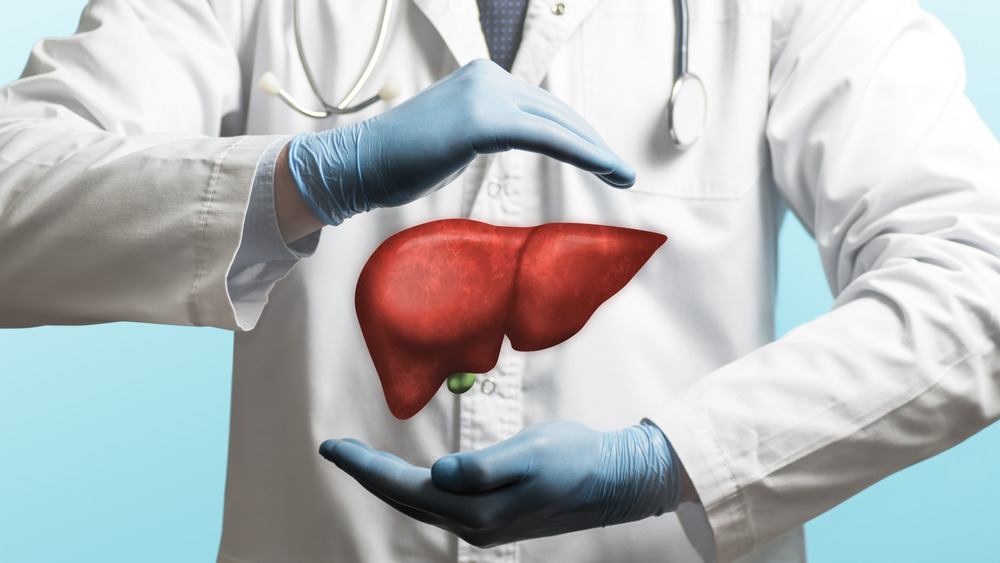You're Taking Too Many Vitamins If This Happens To Your Body
Do you take a multivitamin every morning? How about a B-complex or just an extra vitamin C gummy during cold and flu season? While a good vitamin regimen can be beneficial, there are potential issues — ranging from minor annoyances to major health problems — from overdoing your vitamin intake. And how many supplements you're taking is only the beginning.
As noted by WebMD, common eating habits can also up your daily vitamin totals, and unless you're an avid nutrition label reader, you might not even realize it. That handy energy bar that fits so conveniently inside a purse or a gym bag, that "enriched pasta" for a candlelit dinner for two, even that "part of this complete breakfast" cereal you eat every morning while watching the news could all be packing additional vitamins and minerals into your diet.
Does this mean every spoonful of cereal is putting your life in danger? That's a bit extreme, but knowing the side effects of higher than recommended amounts of vitamins and minerals can open up discussions with your health care professional and possibly improve your quality of life.
Vertigo can be a result of too much vitamin A
As explained by the Mayo Clinic, while vitamin A (also called retinol and retinoic acid) has antioxidant properties and is essential for our vision, healthy cell growth, and reproductive vigor, too much vitamin A can be harmful. What the Clinic cites as a "single large dose" (more than 200,000 micrograms) can lead to nausea and vomiting, as well as blurry vision and vertigo.
But what about smaller doses in the long term? How large the doses are is, of course, a factor, but smaller amounts can cause some serious side effects. The Clinic cautions that if you take an oral supplement containing more than 10,000 micrograms of vitamin A per day, you could experience joint and bone pain, skin irritation, headaches, diarrhea, nausea, and even bone thinning and liver damage. And for a woman who is pregnant, taking vitamin A at this amount and frequency could cause birth defects.
Beyond supplements, the Mayo Clinic noted that foods such as spinach and liver are rich in vitamin A, but the vitamin can also come from less obvious sources like carrots and cantaloupes. Why? Because these foods contain beta-carotene, which is changed by the body into vitamin A.
Too much vitamin C can cause kidney stones
For many people, vitamin C conjures up the sweet, tangy taste of oranges — whether as a cold juice or a vitamin gummy. As BBC News revealed, vitamin C was consumed by 18th century sailors to treat scurvy. Today, it continues to be used in the modern world to combat the common cold (via WebMD). However, it can have side effects.
As noted by WebMD, vitamin C or ascorbic acid can cause stomach issues ranging from cramps and heartburn to nausea and vomiting. Taking more than 2,000 milligrams per day can lead to severe diarrhea and kidney stones. And if you've already had a kidney stone, just taking more than 1,000 milligrams a day raises your chances of developing more.
While fresh fruits and vegetables can be good sources of vitamin C, citrus fruits are especially packed with it (via WebMD). So, the next time you put a lemon in your drink or add some lime slices to your water, keep in mind you're also adding extra vitamin C to your diet. Granted, there's only a small amount in one little fruit wedge, but if you already take a mega dose of the vitamin in supplement form, it's worth keeping an eye on your intake.
Bone less may result from too much vitamin D
Since there aren't that many foods with large amounts of vitamin D (fatty fish being the exception), it's more common to experience vitamin D deficiency than toxicity (via Healthline). The flip side to this is vitamin D supplements are more common, and these supplements when taken in excess over a long period of time can build up in your body, causing a wide range of symptoms.
As noted by Healthline, too much vitamin D can cause diarrhea or constipation, as well as stomach pain, poor appetite, vomiting, nausea, elevated blood levels, and even kidney failure. While your body needs vitamin D to absorb calcium, too much vitamin D can raise calcium blood levels, resulting in bone loss. But wait, isn't calcium good for your bones? Yes, but it needs to stay in your bones — not your blood — to be effective, and research suggests that extremely high doses of vitamin D can interfere with vitamin K2, which keeps calcium in your bones.
One more thing to keep in mind: Because the body gradually releases vitamin D into the blood, side effects from its toxicity can continue for months after you've taken your last supplement (via Healthline).
Too much vitamin B6 can cause conditions from heartburn to photosensitivity
There's good news and bad news when it comes to vitamin B6 (aka pyridoxine). This vitamin can be found in a number of foods, including bananas, chickpeas, fish, potatoes, and poultry, and the Mayo Clinic explained that ingesting large amounts of B6 through meals and snacks is not thought to be harmful. But like so many vitamins, B6 can be taken as a supplement, and high levels of it can cause health issues.
Some of the more common ailments caused by too much vitamin B6 from supplements are nausea and heartburn (via Mayo Clinic). While the vitamin in excess can make you more sensitive to sunlight (a condition called photosensitivity), it can also make you less sensitive to pain or extreme heat and cold and even cause numbness. There have also been reports of painful, scarring skin lesions and ataxia (loss of muscle control and coordination) because of high B6 levels.
In addition, vitamin B6 can interfere with the effectiveness of barbiturates and anticonvulsants, as well as certain chemotherapy and Parkinson's disease drugs, the Mayo Clinic revealed. For this reason, it's important to check with your health care professional about possible interactions between your supplements and your prescriptions.
Frequent headaches? You may be taking too much zinc
Although zinc itself is a mineral, it is commonly found in multivitamins. And like vitamin C, zinc is also a popular choice of defense against the common cold. Pick up a typical cold remedy or even something that just advertises shortening the length and severity of a cold and odds are, you'll see zinc listed in its ingredients. But for that very reason, it's easy to overdo your zinc intake (via Medical News Today).
According to the Office of Dietary Supplements, zinc toxicity can be both acute and chronic. Acute symptoms like diarrhea, headache, nausea, stomachache, and vomiting usually happen not long after a zinc overdose. Chronic zinc toxicity, on the other hand, can lower what's commonly called "good" cholesterol (HDL or high-density lipoprotein), as well as cause copper deficiency and reduce immune function, per Medical News Today.
If you think you have zinc toxicity, there is a simple step you can take at home to help yourself: Drink a glass of milk. It sounds almost too easy to be true, but the calcium and phosphorus in milk can help keep your body from absorbing excess zinc, Medical News Today revealed. Of course, before doing anything, it's wise to contact a health care professional or Poison Control.
Too much selenium can cause hair loss and raise your risk of diabetes
While selenium, an essential mineral common in multivitamins, is found in such foods as fish, crab, wheat, poultry, and liver, how much selenium you get from these foods varies (via WebMD). Why? Imagine two farms that both grow wheat, but the soil in one farm has higher levels of selenium than the soil in the other farm. The result is what you would expect: The farm with the more selenium-rich soil produces wheat with higher amounts of selenium.
In terms of supplements, WebMD explained that selenium toxicity can occur if you take more than 400 micrograms daily. Possible symptoms can include vomiting, irritability, and nausea. Taking a lower dose of it but over a long period of time could increase your chances of developing diabetes. Long-term use can lead to fatigue, hair loss, bad breath (similar to garlic), a metallic taste in the mouth, and nail issues, like inflammation or horizontal streaks across your fingernails.
WebMD also noted that taking selenium can have side effects like facial flushing, feeling lightheaded, and tremors. It can also cause liver, kidney, and blood clotting problems. If you are HIV-positive and breastfeeding, taking more than 400 micrograms of selenium daily could raise how much of the virus is in your breast milk.
That pesky skin rash may be caused by excess vitamin B3
At first glance, vitamin B3 (niacin) looks like a safe choice because it's water-soluble (via Medline Plus). After all, how could something that dissolves in water build up in the body? Wouldn't urinating take care of excess amounts of it? Although that's true, the body still has to process it, and while it's making its way from your stomach to your kidneys, vitamin B3 can cause some side effects. This is why it's important to avoid exceeding 35 milligrams of the vitamin per day (via WebMD).
According to the Medline Plus, high intakes of B3 can cause skin rashes, elevated amounts of blood sugar, liver damage, and peptic ulcers, which can occur either in the stomach or the intestines. Even when it is used to treat high cholesterol, B3 can cause discomfort to the face, neck, arms, or upper chest. Specifically, you may experience tingling, itchiness, redness, or a warm sensation referred to as "flushing."
If you're looking for non-supplement ways to get vitamin B3, though, fish, poultry, lean meats, eggs, and milk are all great sources. Outside of animal-based products, B3 is also found in peanuts, legumes, and rice, according to Medline Plus.
Is your multivitamin to blame for hypercalcemia?
Do you usually pop an antacid when you have an upset stomach? If you said "yes," you're not alone, but keep in mind those antacids contain calcium carbonate, and they along with calcium supplements and many multivitamins can up your calcium levels (via Healthline). In fact, overdoing it on the dietary supplements or over-the-counter medications are a leading cause of potentially dangerously high levels of calcium in the body, or what is known as hypercalcemia.
As Healthline explained, the symptoms of hypercalcemia can be as mild as fatigue or headaches to as severe as abnormal heart rhythms and even coma. Excessive thirst and urination, kidney stones, nausea, vomiting, constipation, decreased appetite, pain in the abdomen, bone pain, muscle cramps and twitching, osteoporosis, and bone fractures can all be the results of too much calcium. Neurological symptoms of hypercalcemia can also be serious and include depression, irritability, confusion, and memory loss.
While contacting your health care professional about any of these symptoms is important, Healthline advised reaching out for help right away if you also have cancer. Besides supplements and antacids, cancer alone can raise calcium levels, which is considered a medical emergency.
Too much vitamin E can cause fatal bleeding
Vitamin E can be your circulatory system's best friend. It helps with blood vessel dilation, lowers your chances of heart disease, and helps prevent blood clots from forming (via Healthline). But these benefits can become health issues when vitamin E levels become very elevated.
As Healthline revealed, when your intake of vitamin E is too high, the same properties in it that stop blood clots from happening can also thin your blood to the point that you could experience fatal bleeding. Not surprisingly, an excess of vitamin E can put you at higher risk of a hemorrhagic stroke, which is caused by bleeding in or around the brain. And, of course, all of these possible scenarios become even more likely if you're already on a blood thinner.
Besides supplements, vitamin E is found in a number of cooking oils, including those made from corn, safflowers, soybeans, sunflowers, and wheat germ (via Healthline). Foods like broccoli, kiwis, tomatoes, peanut butter, spinach, mangoes, almonds, and hazelnuts are also major sources of the vitamin.
Overdoing it on manganese can cause a condition similar to Parkinson's disease
Though a trace mineral, manganese is found in some multivitamins and, thankfully, it's not likely to cause you health concerns. As Medical News Today noted, the body cannot produce manganese — and even foods like brown rice, pinto beans, pecans, sweet potatoes, and spinach only contain a small amount of it. Although it's advised against, even if you overdo it on manganese supplements, it's unlikely you will see any symptoms for years.
However, people in certain occupations, like welders, do have to worry about being exposed to high levels of manganese in the air, according to the publication. And because they are breathing it in rather than ingesting it, the dangers are greater because it goes straight from the nose to the brain. Over time, this overexposure can lead to tremors, problems walking, hallucinations, acute bronchitis, and a condition that is similar to Parkinson's disease called manganism.
Although it is less likely to develop these symptoms from the manganese in multivitamins, supplements, food, and water, it's more of a possibility for people with iron deficiencies and liver conditions (via Medical News Today). Children and newborns are also more at risk of having adverse reactions to manganese.
Diarrhea can result from too much vitamin B5
If you're wondering which foods contain B5, you won't have to look far. Also known as pantothenate and pantothenic acid, B5 is in just about all types of food, ranging from pork and organ meat to shellfish, egg yolks, lentils, whole grain breads, kale, and mushrooms (via Medical News Today). So, as you can imagine, it's not often you'll meet someone with a B5 deficiency.
But as Medical News Today explained, taking 10 to 20 grams per day of B5 can have a negative impact on your system. Typical side effects include diarrhea, increased risk of bleeding, and a possible imbalance of other vitamins in the B family. This is why taking a B complex vitamin with food and water might be a better option than a separate B5 supplement.
B5 supplements might also interact with certain drugs such as blood thinners and cholinesterase inhibitors, which are used to treat Alzheimer's disease, according to the publication. And while all foods contain at least a small amount of the vitamin, Medical News Today recommends against consuming royal jelly, a honeybee byproduct, and taking a vitamin B5 supplement at the same time.
Too much copper in your multivitamin can cause behavior changes
Chances are when you hear the word "copper," pennies and jewelry are more likely to come to mind than supplements. But copper — a mineral essential for your bones, ligaments, and joints – is commonly found in multivitamins. While normal copper blood levels range from 70 to 140 micrograms per deciliter (mcg/dL), anything higher than that can lead to copper toxicity (via Healthline).
As Healthline explained, the side effects of too much copper can be physical, mental, and behavioral. Beyond headaches, fever, and black stool, copper poisoning can also cause jaundice — yellowing of the skin and the white part of the eye. Someone with excessive copper levels may experience sudden mood changes, and become irritable, depressed, or overexcited. And in the long term, this type of poisoning can lead to heart and liver failure, brain damage, and death.
In addition to supplements, substantial amounts of copper can be found in such foods as quinoa, dark chocolate, soybeans, crabs, liver, and asparagus (via Healthline). Also, if your home uses copper pipes, you may have high levels of copper in your water supply. Pipe corrosion, industrial waste, and runoff from nearby farms can also increase the copper toxicity of your water.
Liver damage can be a sign of too much iron
There's no denying how important iron is to the body. Just as lungs are essential to take in oxygen, the iron in red blood cells (called hemoglobin) delivers that oxygen to all of the body's cells (via Healthline). Naturally, being low on iron can be bad for your health, but that doesn't mean too much iron isn't dangerous.
As Healthline noted, taking one dose of an iron supplement or iron-containing multivitamin with 10 to 20 mg/kg (milligrams per kilograms of body weight) can be enough to trigger side effects, including stomach pain and vomiting. Medical help is needed if you take in anything higher than 40 mg/kg. Long-term use of supplements at high doses can also be unsafe because as the iron builds up in the body, it causes life-threatening damage to your brain and liver. In addition, excessive iron can encourage the growth of bacteria and viruses, taxing the immune system.
While red meat is known for being rich in iron, the Mayo Clinic explained that other animal-based meats (poultry, pork, and seafood) as well as plant-based foods (raisins, dried apricots, peas, and spinach) have high iron content. Also, vitamin C helps your body absorb iron.
Too much iodine can cause cancer
If you look at your multivitamin, you will likely see iodine on the label. And considering how much it does for the body, it makes perfect sense. From promoting good bone health to helping your thyroid function, iodine is essential to general fitness (via Medical News Today). Thanks to iodized salt and foods like cod, reduced-fat milk, seaweed, and cheddar cheese, there are plenty of sources for this mineral. So, yes, you can have high levels of it — but there's a twist.
Medical News Today explained that iodine both in excess and in deficient amounts can have some of the exact same side effects on the thyroid. If you develop a goiter, it might mean that you need to start taking iodine supplements or that you need to cut back on them. Therefore, it's important to speak with your health care professional about what supplements you're taking (and not taking).
Too much iodine can also cause inflammation of the thyroid (known as thyroiditis) and thyroid papillary cancer, according to Medical News Today. Rare side effects of very high levels of iodine include fever, diarrhea, vomiting, and even a weaken pulse and becoming comatose.















